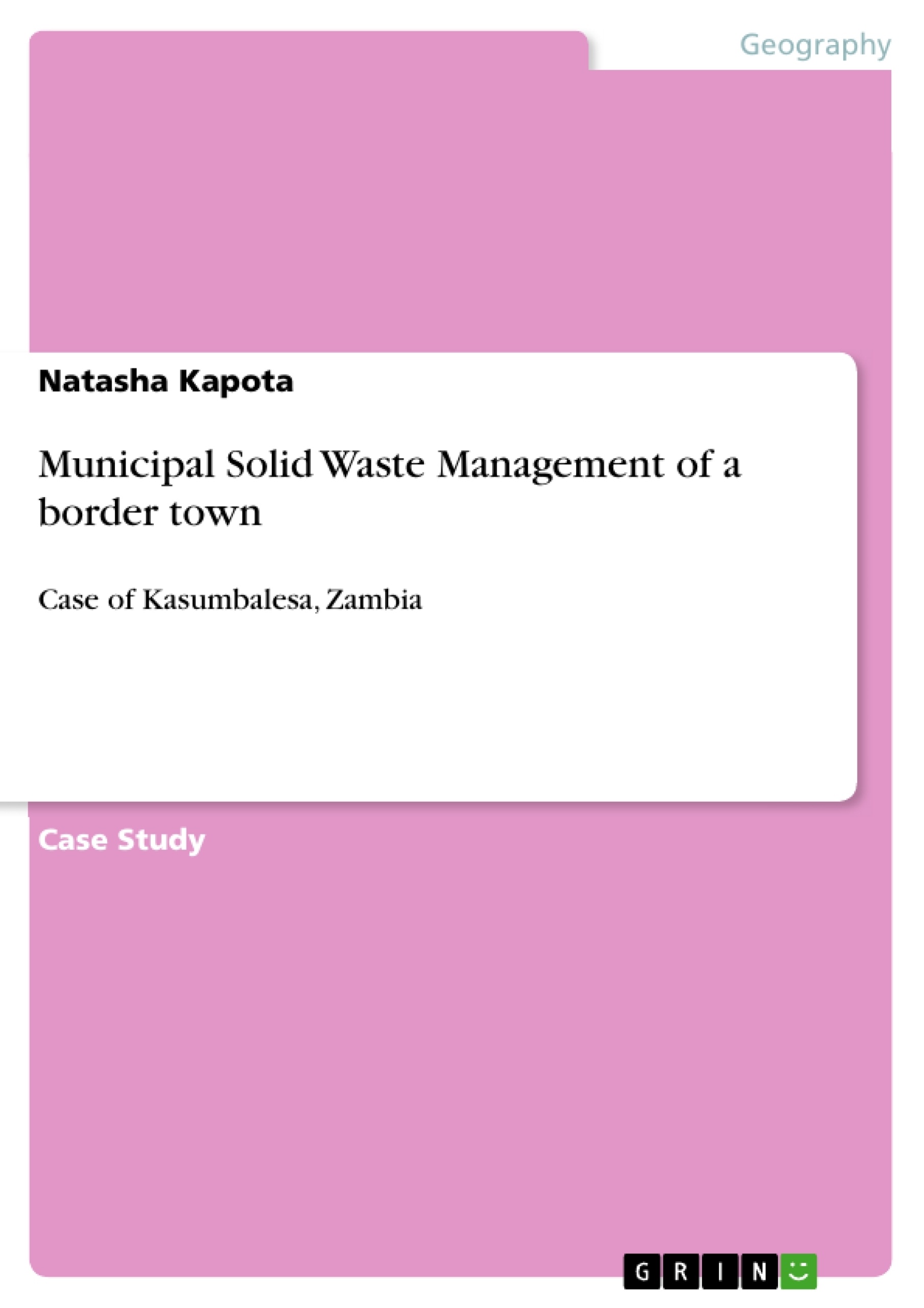This study investigated challenges of Municipal Solid Waste Management in Kasumbalesa border town of Chililabombwe District. The research was conceived through advances made by renowned scholars such as Schübeler, Medina, Mihai, Lindell and UNEP, who have called for a location-specific and decentralized model of addressing challenges of the MSWM. Thus, guided by the System theory, Contingency theory and the ISWM concept, with the use of qualitative, case study research design, the research examined the major challenges of MSWM. Identified the alternative initiatives employed by the municipality and assessed whether the process of waste management was inclusive of various actors existing at Kasumbalesa.
The findings show that, there was a high level of waste generated at the borderlands of Kasumbalesa, due to the increase in the day-time population. This placed a waste collection and disposal challenge on Chililabombwe municipality who were already facing financial, institutional, technical, human resource and socio-cultural challenges. In addition, the research indicated that, even though the public health team had initiatives they wanted to develop they failed to do so due to the weak financial, technical and institutional capacity. Furthermore, the research showed that, the mammoth task of MSWM was regarded as a sole responsibility of the council, thus the process was not inclusive of the diverse range of stakeholders existing at Kasumbalesa.
The paper recommends that intervention is needed in terms of; Chililabombwe municipality opening a sub-station for public health at Kasumbalesa, it emphasizes that financial resources should be ring-fenced for waste management and that sensitization programs must be conducted in various languages. The paper further highlights the need for an all-inclusive process of MSWM at Kasumbalesa border. This means that each and every actor existing at the border should take part in the process of waste management.
Table of Contents
- CHAPTER 1
- INTRODUCTION
- BACKGROUND OF THE RESEARCH PROBLEM
- STATEMENT OF THE RESEARCH PROBLEM
- RESEARCH QUESTIONS
- MAIN OBJECTIVE
- SPECIFIC OBJECTIVES
- SCOPE OF THE STUDY
- RELEVANCE OF THE STUDY
- PROFILE OF THE STUDY AREA
- LOCATION
- CLIMATE
- SYNTHESIS OF THE RESEARCH
Objectives and Key Themes
This study aimed to investigate the challenges of municipal solid waste management (MSWM) in Kasumbalesa, a border town in Zambia, using a qualitative case study approach. It sought to understand the specific challenges within this unique context, considering the high volume of waste generated by trans-border activities. The research applied systems theory, contingency theory, and the integrated solid waste management (ISWM) concept to analyze the situation.
- Challenges of MSWM in a border town context
- The impact of trans-border trade and movement on waste generation
- Assessment of existing waste management initiatives and their effectiveness
- Analysis of the inclusivity of the MSWM process among stakeholders
- Recommendations for improved MSWM practices in Kasumbalesa
Chapter Summaries
CHAPTER 1: BACKGROUND TO THE STUDY: This chapter introduces the research problem, focusing on the challenges of municipal solid waste management (MSWM) in the border town of Kasumbalesa. It establishes the context by highlighting the unique socio-economic activities of border towns and their impact on waste generation. The chapter clearly defines the research problem, outlining the specific research questions and objectives. It also provides a profile of the study area, Kasumbalesa, including its location and climate, setting the stage for a detailed investigation into the MSWM challenges. The chapter concludes with a synthesis of the research, outlining the theoretical frameworks that underpin the study (System theory, Contingency theory, and the ISWM concept).
Keywords
Municipal solid waste management (MSWM), border town, Kasumbalesa, Zambia, trans-border trade, waste generation, qualitative research, case study, systems theory, contingency theory, integrated solid waste management (ISWM), stakeholder inclusivity, financial constraints, institutional capacity, public health.
Frequently Asked Questions: Comprehensive Language Preview
What is the focus of this research?
This research investigates the challenges of municipal solid waste management (MSWM) in Kasumbalesa, a border town in Zambia. It specifically examines the impact of trans-border activities on waste generation and analyzes the effectiveness of existing waste management initiatives.
What methodologies are used in this study?
The study employs a qualitative case study approach. It utilizes systems theory, contingency theory, and the integrated solid waste management (ISWM) concept to analyze the MSWM challenges in Kasumbalesa.
What are the key themes explored in the research?
Key themes include the challenges of MSWM in a border town context, the impact of trans-border trade on waste generation, the assessment of existing waste management initiatives, the inclusivity of the MSWM process among stakeholders, and recommendations for improved MSWM practices.
What is included in the Table of Contents?
The Table of Contents outlines the structure of the research, including an introduction, background of the research problem, statement of the research problem, research questions, objectives, scope, relevance of the study, a profile of the study area (location and climate), and a synthesis of the research.
What are the specific objectives of the study?
The study aims to understand the challenges of MSWM in Kasumbalesa, considering the high volume of waste from trans-border activities. It seeks to assess existing initiatives, analyze stakeholder inclusivity, and provide recommendations for improved practices.
What are the key words associated with this research?
Keywords include Municipal solid waste management (MSWM), border town, Kasumbalesa, Zambia, trans-border trade, waste generation, qualitative research, case study, systems theory, contingency theory, integrated solid waste management (ISWM), stakeholder inclusivity, financial constraints, institutional capacity, and public health.
What theoretical frameworks are used?
The study utilizes systems theory, contingency theory, and the integrated solid waste management (ISWM) concept to provide a comprehensive analysis of the MSWM challenges.
What is the geographical focus of the study?
The research focuses on Kasumbalesa, a border town in Zambia.
What type of research is this?
This is a qualitative case study.
What are the chapter summaries about?
The chapter summaries provide an overview of the content of each chapter, highlighting key findings and arguments.
- Citation du texte
- Natasha Kapota (Auteur), 2018, Municipal Solid Waste Management of a border town, Munich, GRIN Verlag, https://www.grin.com/document/456683



